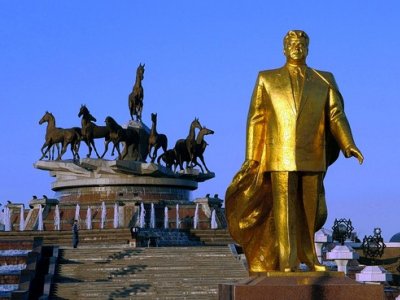
MESSIANIC TRIBUTE ACTS
Strongman leadership is fashionable today, but it is often a poor replica of the dictators who ruined last century.
Hitler, Stalin, Mao, Mussolini, Franco, Hoxha, Mobutu, Gaddafi, Saddam, Assad, Duvalier, Mengistu, Ceausescu, Kim Yong-il, to name only a few.
The dinner party from hell.
Several things happen when people like this come to power. Wealth accumulates among an elite. The leader is sometimes less ostentatious about this than those who surround him, but is often the richest of all. Opulent palaces are built. Vanity projects – often beyond parody – waste vast amounts of public money. Wars are started against neighbouring states. A huge security apparatus is built. Enemies of the people are located on trumped up charges and disposed of without due process.
This sheds light on the temptations of Jesus in the wilderness. By the end, he had deprived himself of food and shelter for so long that he had no physical strength left. This was the moment the devil came to work him over, like a regime’s interrogator in the middle of the night. And it was the fork in the road for Jesus.
One path led to the cross. A journey of pain and isolation. The other led to glamour, riches and domination. Had Jesus chosen the second path, he could have created his own cult of personality. You start by turning the stones into bread, and you end with sumptuous feasts in a palace while people starve in the fields. You begin by throwing yourself off the Temple, only to be caught by the angels, and you end up with a secret police state, where people cringe at your name and the unenthusiastic are tortured in basements. This is what happens when you sell your soul to the devil.
The wilderness temptations inform the meeting of Jesus and Pontius Pilate; the link between Ash Wednesday and Good Friday. The encounter is visceral and deeply symbolic. Here was a man dragged away in the dead of night – rendered to Caesar, if you want – like countless others in history. Jesus knew what lay ahead. Before meeting Pilate, he had been punched in the face. After Pilate, he would be severely beaten before being tortured to death.
The early hours of the morning are disorientating enough and the certainty of what lay ahead as night gave way to day would have been sufficient to silence the bravest of people. And yet Jesus defies every expectation of a bored and sleep deprived Roman ruler. As the conversation progresses, there is an emerging sense that Jesus actually puts Pilate on trial as the symbol of all despotic human power. Of all that is wrong with the world we have invented.
It would have been those words: ‘my kingdom is not from this world’ that arrested Pilate. The Romans ruled their provinces with an ordered viciousness. They understood the pitiless language of brute force and toyed with the weak and vulnerable.
In the natural focus we have on the redeeming work of Christ on the cross, we can overlook the significance of Jesus’ following words: ‘if my kingdom were from this world, my followers would be fighting to keep me from being handed over’, he says. In these words, Jesus passes explicit judgment on all ways in which the Gospel has been spread by force. However well intentioned some may have been, Jesus established an exclusively peaceful basis for our mission the moment he told Peter to put his sword away in Gethsemane. People cannot be coerced into a relationship with Christ; they come to him by love and humble persuasion.
And then, in response to Jesus’ testimony, Pilate utters those words: what is truth? If this encounter had been a scripted play, the author or the director would inform the actor where to put the emphasis. Was Pilate engaged or bored? Was it a serious question of a ruler living with blood guilt or the cynical remark of a man who was past caring? If John’s text is to be believed, they were not the words of a man with an earnest desire to know because no sooner had he uttered the words, he was outside, telling Jesus’ accusers he wasn’t interested in this case.
It feels that for Pilate, truth was meaningless. We have a saying about dissidents, that they speak truth to power. Jesus clearly was here. But the despots of the world have it the other way round: they speak power to truth. Using military power and black site prisons, they suffocate dissent. But the truth cannot be extinguished. It stood in front of Pilate in flesh and blood. He couldn’t see it and neither could he crush it. Only three days later, the world would discover that truth is indestructible.
By divesting himself of all the trappings of power, Jesus made it possible for the unclean to be purified, the outcast to be embraced, the diseased to be healed. But it also allowed the cruelty of the Roman empire and the venality of Judean rule to kill him slowly at the right time. It is a mark of the greatness of the Saviour we worship that he emptied himself of the power that could have saved him in order to save us.
His leadership was one of service and sacrifice. The closer any society comes to having leaders who embody this ethic, the better life is for everyone; the nearer the kingdom comes. Few people have the lust or the chance to become an autocrat, but each of us is faced with endless small choices that place us on a continuum that starts with Jesus an ends with a monster.
And experience shows us it’s a scale that can slide.
POPULAR ARTICLES

God In The Cow Shed
2020 has been dominated by the C word. Not that C word. I mean conspiracy theory involve space. Some people believe the

Viral With The Holy Spirit
Since the tech revolution, insurgent new start-ups have enjoyed using the word ‘disruption’

Long Lost family
Some types of storytelling mess with your brain. Intentionally. Like one of those novels where you assume

Valuing Age
Lots of work is being done round unconscious bias in society, especially around gender and ethnicity

